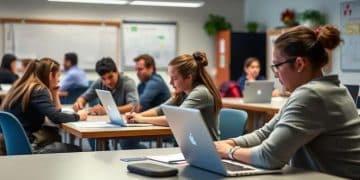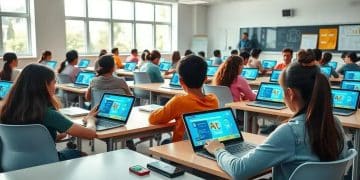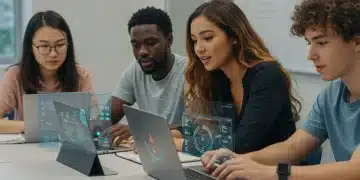Remote learning platforms trends: what to expect in 2024

Remote learning platforms trends focus on personalization, accessibility, and the integration of advanced technologies like AI and gamification, enhancing student engagement and global collaboration in education.
Remote learning platforms trends are reshaping how we approach education today. As technology leaps forward, many of us wonder: how will these changes affect our learning experiences? Let’s dive into the latest developments.
The rise of hybrid learning environments
The concept of hybrid learning environments is becoming increasingly popular in education today. This model combines traditional classroom learning with online education, offering flexibility and a more personalized approach for students and teachers alike.
Understanding Hybrid Learning
In a hybrid model, students can attend some classes in person while participating in others remotely. This blend allows for a variety of learning styles and experiences. For those who thrive on interaction, in-person sessions can provide essential social connections.
Benefits of Hybrid Learning
- Flexibility in scheduling to accommodate different learning paces.
- Access to a wider range of resources and digital tools.
- Enhanced engagement through interactive online components.
- Personalized learning experiences tailored to individual needs.
The adoption of hybrid learning is also driven by technological advancements. Schools are increasingly utilizing tools like video conferencing, learning management systems, and educational apps to facilitate this approach. As technology continues to evolve, so too does the potential for more engaging and effective educational experiences.
Educators play a crucial role in the success of hybrid learning environments. By incorporating diverse teaching methods, they can ensure that all students remain engaged and motivated, whether they are in the classroom or learning from home. Training teachers to effectively navigate both in-person and online instruction is key to a successful transition.
Challenges of Hybrid Learning
Despite its many advantages, hybrid learning also presents challenges. Ensuring that all students have equal access to technology is vital. Additionally, maintaining a cohesive classroom community can be difficult when some students learn remotely. To address these challenges, schools must invest in the appropriate resources and training.
As hybrid learning continues to rise, its impact on the future of education remains to be seen. Educators, students, and families are all adapting to this innovative approach, creating new opportunities for learning and collaboration.
Key features of successful remote learning platforms

Successful remote learning platforms share several key features that enhance the educational experience for both students and teachers. These platforms need to be user-friendly, engaging, and adaptable to various learning styles.
User-Friendly Interfaces
A crucial feature of any remote learning platform is its interface. It should be intuitive, making it easy for users to navigate through lessons, assignments, and resources. When students can easily find what they need, learning becomes more efficient.
Engaging Learning Materials
Dynamic content keeps students interested and motivated. Successful platforms often include multimedia elements like videos, interactive quizzes, and gamified learning experiences. These features engage students on multiple levels, reinforcing knowledge and making learning fun.
- Incorporation of multimedia resources such as videos and infographics.
- Interactive quizzes that provide instant feedback.
- Gamification elements to encourage participation.
Another essential aspect is the ability to provide personalized learning experiences. Platforms that adapt to each student’s needs and pace can significantly improve learning outcomes. This personalization can be achieved through AI-driven assessments that help tailor content to the learner’s progress.
Robust Communication Tools
Clear communication channels are vital for successful remote learning. This includes messaging systems, forums, and video conferencing tools that allow for easy interaction between students and instructors. When students feel connected, they are more likely to participate actively.
Moreover, continuous feedback mechanisms play a significant role in remote education. Platforms that enable instructors to give timely and constructive feedback can enhance student understanding and performance. Implementing peer reviews and self-assessment tools further enriches the learning experience.
Overall, the best remote learning platforms empower both students and teachers by providing the right tools and features for effective online education.
Emerging technologies shaping online education
Emerging technologies are significantly shaping online education, bringing innovative tools and approaches that enhance learning experiences. From artificial intelligence to virtual reality, these advancements are transforming how students engage with educational content.
Artificial Intelligence in Education
Artificial intelligence (AI) is revolutionizing online education in various ways. AI-driven platforms can analyze student performance and adapt to individual learning styles. This ensures that learners receive personalized resources and support tailored to their needs.
Virtual and Augmented Reality
Virtual reality (VR) and augmented reality (AR) provide immersive learning experiences that traditional methods cannot match. With VR, students can visit historical sites or conduct science experiments virtually, making lessons more engaging and memorable.
- Interactive simulations that allow experiential learning.
- Virtual field trips to global locations.
- Augmented reality applications that enhance textbooks.
Another exciting trend is the use of blockchain technology in education. It ensures secure certification and credentialing of students, enabling lifelong learning. This technology can provide transparent records while simplifying the verification process for employers.
Gamification is also becoming prevalent in online education. By integrating game-like elements, platforms can motivate students through rewards and competition. This makes learning more enjoyable and encourages continued participation.
Cloud Computing
Cloud computing has made accessing educational resources easier than ever. Students can store and share documents, collaborate in real-time, and access their work from any device with internet connectivity. This flexibility promotes teamwork and enhances learning opportunities.
As these emerging technologies continue to develop, their impact on online education will only grow. They offer the potential for more interactive, engaging, and personalized learning experiences that cater to the diverse needs of students around the world.
Future predictions for remote education trends

The future of remote education trends is exciting and full of potential. As technology continues to advance, we can expect many changes that will enhance how students learn and interact with educational content.
Increased Personalization
One key prediction is the rise of more personalized learning experiences. With the help of artificial intelligence, platforms will better understand individual student needs. This means lessons will adapt in real-time, providing tailored resources and support.
Greater Accessibility
Accessibility will also improve. As internet connectivity expands and technology becomes cheaper, more students worldwide will access quality education from home. This opens doors for learners from all backgrounds, ensuring equal opportunities.
- More inclusive platforms designed for diverse learning needs.
- Enhanced support for students with disabilities.
- Global classrooms that connect students regardless of location.
Collaboration will likely become a hallmark of future remote education. Students from different regions will participate in joint projects and forums. This can build cultural awareness and foster teamwork skills.
Integration of Gamification
Additionally, gamification will play a significant role in keeping students motivated. Future platforms may incorporate even more game-like elements, such as leaderboards and rewards, to encourage participation and achievement.
Virtual and augmented reality technologies will also shape remote education deeply. Students will virtually explore historical sites or conduct science experiments in 3D environments. These immersive experiences can enhance understanding and retention of knowledge.
Overall, the predictions for the future of remote education point towards more engaging, inclusive, and adaptive learning environments. As we embrace these changes, students can look forward to enriched educational journeys.
FAQ – Frequently Asked Questions about Remote Education Trends
What are remote education trends?
Remote education trends refer to the evolving methods, technologies, and practices that enhance learning experiences through online platforms.
How will AI influence remote education?
AI will personalize learning by adapting resources and support to meet individual student needs, improving overall engagement.
What role does gamification play in online learning?
Gamification incorporates game-like elements to motivate and engage students, making the learning experience fun and interactive.
How can students collaborate in remote learning?
Students can collaborate through virtual projects, discussions, and shared resources on online platforms, fostering teamwork and cultural exchange.





